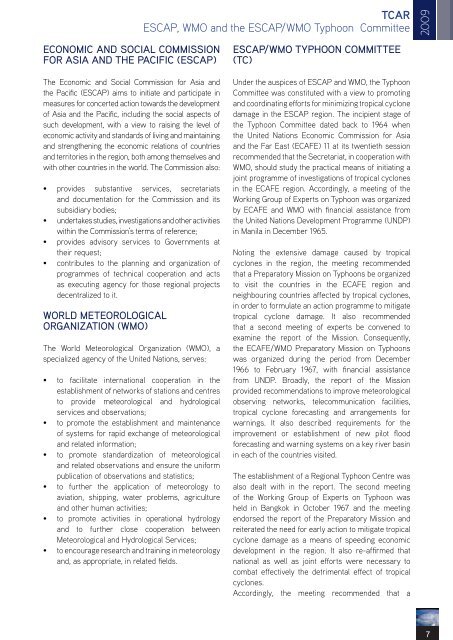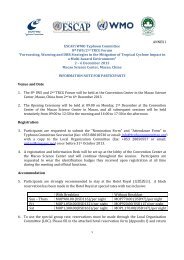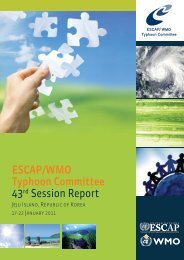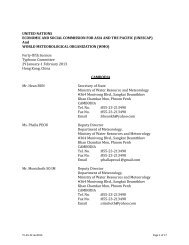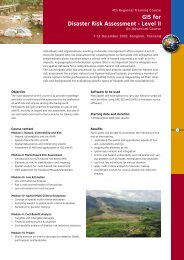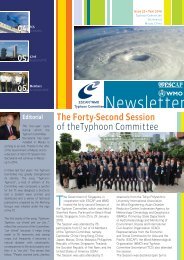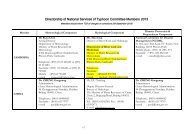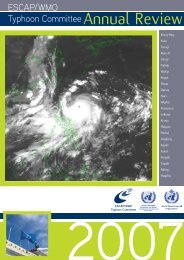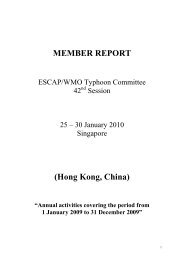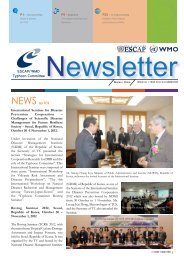TCAR - Typhoon Committee
TCAR - Typhoon Committee
TCAR - Typhoon Committee
Create successful ePaper yourself
Turn your PDF publications into a flip-book with our unique Google optimized e-Paper software.
ECONOMIC AND SOCIAL COMMISSION<br />
FOR ASIA AND THE PACIFIC (ESCAP)<br />
The Economic and Social Commission for Asia and<br />
the Pacific (ESCAP) aims to initiate and participate in<br />
measures for concerted action towards the development<br />
of Asia and the Pacific, including the social aspects of<br />
such development, with a view to raising the level of<br />
economic activity and standards of living and maintaining<br />
and strengthening the economic relations of countries<br />
and territories in the region, both among themselves and<br />
with other countries in the world. The Commission also:<br />
• provides substantive services, secretariats<br />
and documentation for the Commission and its<br />
subsidiary bodies;<br />
• undertakes studies, investigations and other activities<br />
within the Commission’s terms of reference;<br />
• provides advisory services to Governments at<br />
their request;<br />
• contributes to the planning and organization of<br />
programmes of technical cooperation and acts<br />
as executing agency for those regional projects<br />
decentralized to it.<br />
WORLD METEOROLOGICAL<br />
ORGANIZATION (WMO)<br />
The World Meteorological Organization (WMO), a<br />
specialized agency of the United Nations, serves:<br />
• to facilitate international cooperation in the<br />
establishment of networks of stations and centres<br />
to provide meteorological and hydrological<br />
services and observations;<br />
• to promote the establishment and maintenance<br />
of systems for rapid exchange of meteorological<br />
and related information;<br />
• to promote standardization of meteorological<br />
and related observations and ensure the uniform<br />
publication of observations and statistics;<br />
• to further the application of meteorology to<br />
aviation, shipping, water problems, agriculture<br />
and other human activities;<br />
• to promote activities in operational hydrology<br />
and to further close cooperation between<br />
Meteorological and Hydrological Services;<br />
• to encourage research and training in meteorology<br />
and, as appropriate, in related fields.<br />
<strong>TCAR</strong><br />
ESCAP, WMO and the ESCAP/WMO <strong>Typhoon</strong> <strong>Committee</strong><br />
ESCAP/WMO TYPHOON COMMITTEE<br />
(TC)<br />
Under the auspices of ESCAP and WMO, the <strong>Typhoon</strong><br />
<strong>Committee</strong> was constituted with a view to promoting<br />
and coordinating efforts for minimizing tropical cyclone<br />
damage in the ESCAP region. The incipient stage of<br />
the <strong>Typhoon</strong> <strong>Committee</strong> dated back to 1964 when<br />
the United Nations Economic Commission for Asia<br />
and the Far East (ECAFE) 11 at its twentieth session<br />
recommended that the Secretariat, in cooperation with<br />
WMO, should study the practical means of initiating a<br />
joint programme of investigations of tropical cyclones<br />
in the ECAFE region. Accordingly, a meeting of the<br />
Working Group of Experts on <strong>Typhoon</strong> was organized<br />
by ECAFE and WMO with financial assistance from<br />
the United Nations Development Programme (UNDP)<br />
in Manila in December 1965.<br />
Noting the extensive damage caused by tropical<br />
cyclones in the region, the meeting recommended<br />
that a Preparatory Mission on <strong>Typhoon</strong>s be organized<br />
to visit the countries in the ECAFE region and<br />
neighbouring countries affected by tropical cyclones,<br />
in order to formulate an action programme to mitigate<br />
tropical cyclone damage. It also recommended<br />
that a second meeting of experts be convened to<br />
examine the report of the Mission. Consequently,<br />
the ECAFE/WMO Preparatory Mission on <strong>Typhoon</strong>s<br />
was organized during the period from December<br />
1966 to February 1967, with financial assistance<br />
from UNDP. Broadly, the report of the Mission<br />
provided recommendations to improve meteorological<br />
observing networks, telecommunication facilities,<br />
tropical cyclone forecasting and arrangements for<br />
warnings. It also described requirements for the<br />
improvement or establishment of new pilot flood<br />
forecasting and warning systems on a key river basin<br />
in each of the countries visited.<br />
The establishment of a Regional <strong>Typhoon</strong> Centre was<br />
also dealt with in the report. The second meeting<br />
of the Working Group of Experts on <strong>Typhoon</strong> was<br />
held in Bangkok in October 1967 and the meeting<br />
endorsed the report of the Preparatory Mission and<br />
reiterated the need for early action to mitigate tropical<br />
cyclone damage as a means of speeding economic<br />
development in the region. It also re-affirmed that<br />
national as well as joint efforts were necessary to<br />
combat effectively the detrimental effect of tropical<br />
cyclones.<br />
Accordingly, the meeting recommended that a<br />
2009<br />
7


